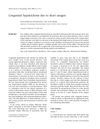33 citations,
July 2007 in “Skin research and technology” Thicker hair is stronger, regardless of age, gender, or other factors.
 68 citations,
April 2012 in “Journal of Investigative Dermatology”
68 citations,
April 2012 in “Journal of Investigative Dermatology” The conclusion is that Fgf18 and Tgf-ß signaling could be targeted for hair loss treatments.

Combining oral and topical treatments improves hair growth more than using either alone.
 January 2012 in “Journal of Natural Remedies”
January 2012 in “Journal of Natural Remedies” The Abrus precatorius extract can effectively promote hair growth similar to standard treatments.
 67 citations,
November 2002 in “Journal of The American Academy of Dermatology”
67 citations,
November 2002 in “Journal of The American Academy of Dermatology” The document concludes that careful evaluation is key to diagnose and treat women with hair loss, with tests for thyroid, iron, and hormones as needed.
 October 2024 in “Experimental Dermatology”
October 2024 in “Experimental Dermatology” The belief about hair shedding phases is likely incorrect and needs reevaluation.
 91 citations,
April 2011 in “Journal of Ethnopharmacology”
91 citations,
April 2011 in “Journal of Ethnopharmacology” Polygonum multiflorum extract helps grow hair by activating certain hair growth signals in mice.
 73 citations,
March 2010 in “Food and Chemical Toxicology”
73 citations,
March 2010 in “Food and Chemical Toxicology” Zizyphus jujuba essential oil can promote hair growth.
 9 citations,
March 2009 in “European Journal of Dermatology”
9 citations,
March 2009 in “European Journal of Dermatology” Schisandra nigra extract may help hair grow by stimulating cells and preventing hair follicle damage.
 144 citations,
July 2002 in “Clinical and Experimental Dermatology”
144 citations,
July 2002 in “Clinical and Experimental Dermatology” Telogen effluvium is a common type of hair loss that can resolve on its own or become chronic, with treatment depending on early diagnosis.
 31 citations,
September 2009 in “Natural Product Research”
31 citations,
September 2009 in “Natural Product Research” Citrullus colocynthis fruit extract may effectively treat testosterone-related hair loss, similar to finasteride.
 January 2012 in “Postgraduate obstetrics & gynecology”
January 2012 in “Postgraduate obstetrics & gynecology” Up to half of women by age 50 experience significant hair loss, with various types and treatments available.
 134 citations,
January 2010 in “Biomedical research”
134 citations,
January 2010 in “Biomedical research” Low oxygen conditions increase the hair-growing effects of substances from fat-derived stem cells by boosting growth factor release.
 12 citations,
January 2010 in “European Journal of Dermatology”
12 citations,
January 2010 in “European Journal of Dermatology” Norgalanthamine from Crinum asiaticum may help hair grow.
 12 citations,
December 2009 in “Amino Acids”
12 citations,
December 2009 in “Amino Acids” Putting α-methylspermidine on mouse skin can start hair growth.
 121 citations,
May 2009 in “Journal of Ethnopharmacology”
121 citations,
May 2009 in “Journal of Ethnopharmacology” Eclipta alba extract may help hair grow similarly to Minoxidil.
 22 citations,
March 2009 in “Journal of Natural Medicines”
22 citations,
March 2009 in “Journal of Natural Medicines” Erica multiflora plant extract can help hair grow by stimulating growth-related cells and triggering hair cycle changes.
 35 citations,
August 2001 in “Journal of Cutaneous Medicine and Surgery”
35 citations,
August 2001 in “Journal of Cutaneous Medicine and Surgery” Tacrolimus is effective for various skin conditions with fewer side effects than cyclosporine.
 275 citations,
March 1999 in “Journal of The American Academy of Dermatology”
275 citations,
March 1999 in “Journal of The American Academy of Dermatology” Chemotherapy can cause various skin reactions, with hair loss being the most common, and proper diagnosis and treatment of these reactions are important.
 13 citations,
December 2006 in “Journal of experimental animal science”
13 citations,
December 2006 in “Journal of experimental animal science” Interferon gamma alone can't cause alopecia areata in C3H/HeJ mice.
July 2020 in “The journal of investigative dermatology/Journal of investigative dermatology” A mutation in the KRT82 gene is significantly associated with Alopecia Areata.
 52 citations,
May 2003 in “The journal of investigative dermatology/Journal of investigative dermatology”
52 citations,
May 2003 in “The journal of investigative dermatology/Journal of investigative dermatology” Parathyroid hormone-related protein helps control hair growth phases in mice.
 January 2024 in “Современные проблемы науки и образования (Modern Problems of Science and Education)”
January 2024 in “Современные проблемы науки и образования (Modern Problems of Science and Education)” Miliacin helps extend the hair growth phase in mice with hair loss.
 63 citations,
August 2008 in “Journal of Cosmetic Dermatology”
63 citations,
August 2008 in “Journal of Cosmetic Dermatology” Cuscuta reflexa extract may help treat hair loss caused by hormones.
 98 citations,
May 2008 in “Archives of Dermatological Research”
98 citations,
May 2008 in “Archives of Dermatological Research” Eclipta alba extract helps hair grow faster and more effectively than minoxidil in rats.
 115 citations,
August 2008 in “The Journal of Clinical Endocrinology & Metabolism”
115 citations,
August 2008 in “The Journal of Clinical Endocrinology & Metabolism” Thyroid hormones help hair grow, reduce hair loss, and increase hair pigment.
 26 citations,
October 2007 in “Experimental Dermatology”
26 citations,
October 2007 in “Experimental Dermatology” L-Carnitine-L-tartrate may help hair grow and prevent hair loss.
 42 citations,
September 2000 in “British Journal of Dermatology”
42 citations,
September 2000 in “British Journal of Dermatology” Some children are born with unusually short, fine hair because their hair growth phase is short, but this often gets better by itself during puberty.
 33 citations,
January 2006 in “Journal of Dermatological Science”
33 citations,
January 2006 in “Journal of Dermatological Science” A long-acting Vitamin C derivative helps hair grow by stimulating cells and increasing growth factors.
 January 2012 in “Elsevier eBooks”
January 2012 in “Elsevier eBooks” Hair loss can cause emotional and social issues, and various treatments, including medication, surgery, and psychological support, are needed.



























